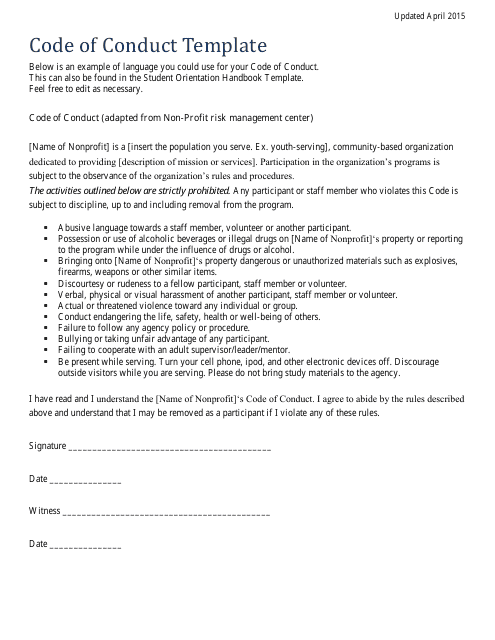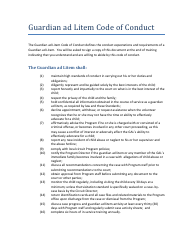Code of Conduct Template - Sample
A Code of Conduct Template - Sample is a document that provides guidelines and expectations for behavior in a specific organization or group. It outlines the standards of conduct and ethical principles that individuals should follow while working or interacting within that organization.
The organization or company typically files the Code of Conduct Template - Sample.
FAQ
Q: What is a code of conduct?
A: A code of conduct is a set of guidelines and principles that individuals or organizations follow to promote ethical behavior and establish expectations for acceptable conduct.
Q: Why is a code of conduct important?
A: A code of conduct is important because it helps to create a safe and respectful environment, promotes fairness and equality, and helps prevent misconduct and unethical behavior.
Q: What should a code of conduct include?
A: A code of conduct should include guidelines for professional behavior, standards for business ethics, rules for confidentiality, procedures for reporting misconduct, and consequences for violations.
Q: Who should follow a code of conduct?
A: A code of conduct should be followed by employees, members of an organization, and anyone associated with the organization.
Q: How can a code of conduct be implemented?
A: A code of conduct can be implemented by distributing it to all individuals or employees, providing training on the code, and enforcing it consistently.
Q: What are the benefits of having a code of conduct?
A: Having a code of conduct can improve workplace culture, enhance trust and reputation, reduce legal risks, and promote ethical decision-making.
Q: What happens if someone violates a code of conduct?
A: If someone violates a code of conduct, they may face disciplinary action, such as warnings, suspension, or termination, depending on the severity of the violation.
Q: Can a code of conduct be changed or updated?
A: Yes, a code of conduct can be changed or updated as needed to reflect new regulations, industry standards, or organizational values.
Q: Are codes of conduct legally binding?
A: Codes of conduct are generally not legally binding, but they can provide a basis for legal action if a violation leads to harm or damages.






